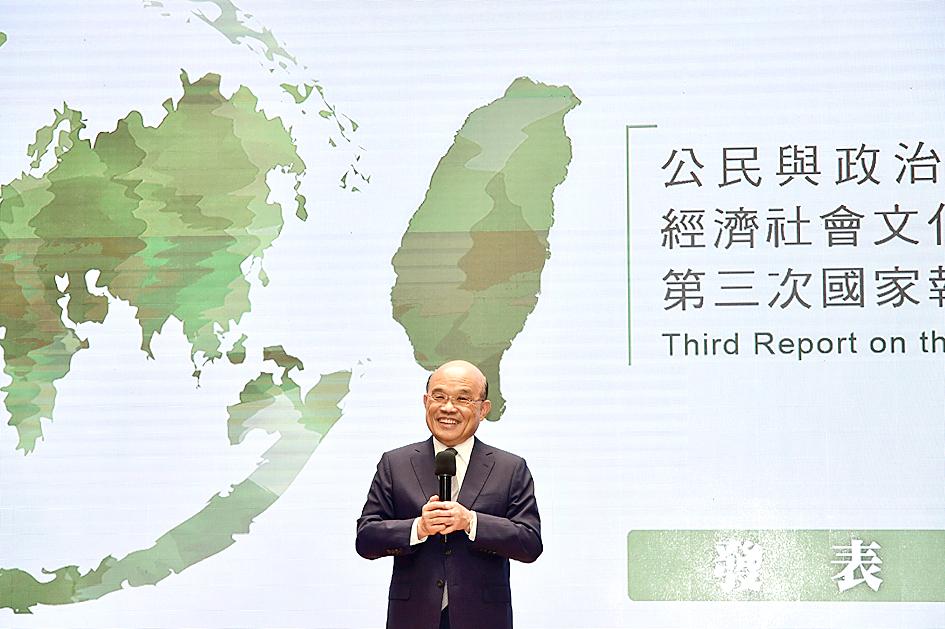The Executive Yuan yesterday published Taiwan’s third national report on the implementation of two international human rights covenants, touting milestones set over the past four years, including the decriminalization of adultery and legalization of same-sex marriage.
The UN International Covenant on Civil and Political Rights and the International Covenant on Economic, Social and Cultural Rights state that member states should submit a national report on the implementation of each covenant every four years.
Taiwan ratified the two covenants in 2009 and then passed legislation to make them part of domestic law.

Photo: George Tsorng, Taipei Times
The latest report documents human rights efforts made by the government, Premier Su Tseng-chang (蘇貞昌) said.
For example, it has been one year since same-sex marriage was legalized, and although many expressed concerns over the legalization one year ago, polls show that more than half of Taiwanese now support equal marriage rights, Su said.
The government has also established national human rights parks, he said, in an apparent reference to the Jing-Mei White Terror Memorial Park (白色恐怖景美紀念園區) in New Taipei City and the Green Island White Terror Memorial Park (白色恐怖綠島紀念園區), which commemorate Martial Law era victims.
Yesterday was the first time the report was published under the name of the Executive Yuan. Previously the reports were submitted by the Presidential Office’s Human Rights Consultative Committee, which stopped operating on May 19, after the Organic Act of the Control Yuan National Human Rights Commission (監察院國家人權委員會組織法) took effect on May 1.
To promote “the right to adequate standard of housing,” the Ministry of the Interior has completed national housing projects and their budgeting, as well as promoted the registration of the actual selling prices of real estate, so that house buyers can view transparent details of the transactions, Executive Yuan Human Rights Protection and Promotion Committee convener Lo Ping-cheng (羅秉成) said.
The Labor Standards Act (勞動基準法) has been expanded to include resident doctors in its protection, while the Labor Dispute Act (勞動事件法), which took effect in January, safeguards the rights of parties in labor-management litigations, he said.
Fishers have enhanced protection now under the Regulations on the Authorization and Management of Overseas Employment of Foreign Crew Members (境外僱用非我國籍船員許可及管理辦法), he said.
The government plans to make several other international human rights pacts part of domestic law, and it is to introduce more action plans on Human Rights Day on Dec. 10, he added.
Additional reporting by CNA

CALL FOR SUPPORT: President William Lai called on lawmakers across party lines to ensure the livelihood of Taiwanese and that national security is protected President William Lai (賴清德) yesterday called for bipartisan support for Taiwan’s investment in self-defense capabilities at the christening and launch of two coast guard vessels at CSBC Corp, Taiwan’s (台灣國際造船) shipyard in Kaohsiung. The Taipei (台北) is the fourth and final ship of the Chiayi-class offshore patrol vessels, and the Siraya (西拉雅) is the Coast Guard Administration’s (CGA) first-ever ocean patrol vessel, the government said. The Taipei is the fourth and final ship of the Chiayi-class offshore patrol vessels with a displacement of about 4,000 tonnes, Lai said. This ship class was ordered as a result of former president Tsai Ing-wen’s (蔡英文) 2018

UKRAINE, NVIDIA: The US leader said the subject of Russia’s war had come up ‘very strongly,’ while Jenson Huang was hoping that the conversation was good Chinese President Xi Jinping (習近平) and US President Donald Trump had differing takes following their meeting in Busan, South Korea, yesterday. Xi said that the two sides should complete follow-up work as soon as possible to deliver tangible results that would provide “peace of mind” to China, the US and the rest of the world, while Trump hailed the “great success” of the talks. The two discussed trade, including a deal to reduce tariffs slapped on China for its role in the fentanyl trade, as well as cooperation in ending the war in Ukraine, among other issues, but they did not mention

HOTEL HIRING: An official said that hoteliers could begin hiring migrant workers next year, but must adhere to a rule requiring a NT$2,000 salary hike for Taiwanese The government is to allow the hospitality industry to recruit mid-level migrant workers for housekeeping and three other lines of work after the Executive Yuan yesterday approved a proposal by the Ministry of Labor. A shortage of workers at hotels and accommodation facilities was discussed at a meeting of the legislature’s Transportation Committee. A 2023 survey conducted by the Tourism Administration found that Taiwan’s lodging industry was short of about 6,600 housekeeping and cleaning workers, the agency said in a report to the committee. The shortage of workers in the industry is being studied, the report said. Hotel and Lodging Division Deputy Director Cheng

‘SECRETS’: While saying China would not attack during his presidency, Donald Trump declined to say how Washington would respond if Beijing were to take military action US President Donald Trump said that China would not take military action against Taiwan while he is president, as the Chinese leaders “know the consequences.” Trump made the statement during an interview on CBS’ 60 Minutes program that aired on Sunday, a few days after his meeting with Chinese President Xi Jinping (習近平) in South Korea. “He [Xi] has openly said, and his people have openly said at meetings, ‘we would never do anything while President Trump is president,’ because they know the consequences,” Trump said in the interview. However, he repeatedly declined to say exactly how Washington would respond in